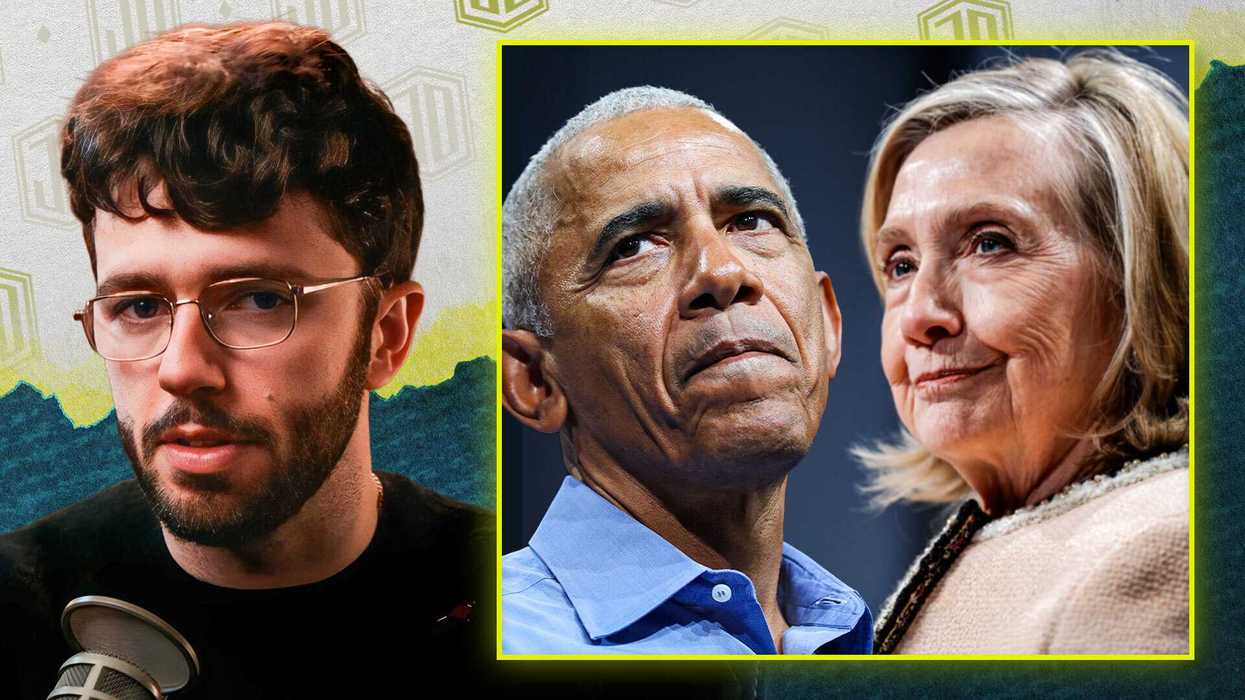
© 2026 Blaze Media LLC. All rights reserved.
The Amateur': Did Obama Book Author Violate Journalistic Ethics by Lying to Rev. Wright During Their Interview?
May 19, 2012
"I think he's anti-Semitic."
 This week, author Ed Klein's book, "The Amateur," has been the focus of a great deal of media scrutiny and coverage. While there is certainly some compelling content in the author's three-hour interview with the Rev. Jeremiah Wright, ideological inconsistencies and contradictory statements create some journalistic questions worth pondering.
This week, author Ed Klein's book, "The Amateur," has been the focus of a great deal of media scrutiny and coverage. While there is certainly some compelling content in the author's three-hour interview with the Rev. Jeremiah Wright, ideological inconsistencies and contradictory statements create some journalistic questions worth pondering.
Initially, The Blaze received edited clips that were extracted from Klein's complete interview. After we shared these with the general public, we secured the recording in its entirety. Upon examining its content and then hearing Klein speak to media about his book, we noticed some noteworthy inconsistencies. The questions and wording that Klein used to extract answers from Wright, when compared to the media statements he has made surrounding the book, didn't quite mesh.
At various points, it seems as though the author purposefully appealed to Wright by making comments and proclamations that indicated that he agreed with the controversial preacher's worldview. If these views on the part of Klein were genuine, one would resign to the fact that the author was merely sharing his own perspective. But, after Klein's discussions about the interview with both Sean Hannity and Glenn Beck, this doesn't seem to be the case.
As The Blaze noted earlier, Klein lambasted Hannity, Beck and Bill O'Reilly during his discussion with Wright, calling them "right wing crazies." After learning about this less than flattering title and contending that Klein seemed to be working diligently to appease Wright during the interview, Hannity confronted the author on his television program Thursday night.
"To get from the Rev. Wright what I needed to give to him, I felt I needed to win over his confidence,” Klein told Hannity, going on to apologize for his appeasement and harsh critique. "And in doing so, I think I went too far, quite frankly."
When Beck brought up the same issues on his radio program Friday morning, Klein offered a similar answer, admitting that he was essentially attempting to break the ice so that he would be able to extract viable data from Barack Obama's former spiritual leader.
"When I sat down with him and we went into deep discussions about various things and he was a little reluctant at first, I went a bit overboard, to put it mildly, in trying to make him feel comfortable with me," the author explained to Beck. "And when I made these comments about you and Hannity and O'Reilly and so forth -- it wasn't something that I normally do, but I was trying to get him to come out of his cocoon or shell."
Listen to Klein's appearance on Glenn Beck's radio show Friday morning:
What both of these statements divulge, on the surface, may seem acceptable to some. But considering journalistic ethics and the need to be forthcoming, one wonders if Klein sacrificed his professional values in an effort to convince Wright to come clean with some noteworthy information. On one hand, using such a tactic on a heavily-guarded individual like Wright makes sense; on the other, it calls into question the tactics as potentially outside of an ethical periphery.
As Wright sat and spoke with Klein, based on the author's friendly commentary, the preacher likely assumed it was a safe space to share personal stories and issues that he had faced during and in the wake of the 2008 campaign. Yet, following the book's publication, Klein is making media appearances in which he openly proclaims his qualms about the faith leader's character.
While speaking with Beck about getting his Nov. 2011 interview set up with Wright, Klein said that numerous individuals, who had at one time supported Obama, urged him to meet with Wright. However, the author said that he had some serious reservations about the pastor -- reservations that he clearly hid while meeting with Wright.
"You know, quite frankly, I'm not exactly fond of the Rev. Jeremiah Wright, because I'm Jewish," Klein said, recalling his initial reaction to the suggestion that he meet with the faith leader. "I think he's anti-Semitic. He says these awful things about America."

While these emotions are perfectly fine if they're legitimate, the comments he made during the actual exchange reflect opposing views. After telling Wright that the aforementioned conservative commentators are "crazies," Klein spoke for an elongated amount of time, using the opportunity to further appeal to Wright.
Next, he highlighted the fact that many right-leaning commentators accuse Wright of being anti-American, anti-Semitic and anti-white. Klein was careful to say that he was merely using others' words. In fact, he even tells Wright, "I'm quoting now -- because I don't believe this." But this morning, Klein admitted on air that he does, indeed, believe that Wright is an anti-Semite.
Then, Klein went on to discuss "the ignorance of white people as far as the black church is concerned." According to the author, most white people lack adequate knowledge about the black church in America. In the audio, Klein can be heard saying that, because whites generally haven't been to African American churches, they don't necessarily understand how they operate. Here is a portion of the transcript from his words:
"You, in particular, bring an Afro-centric point of view to your ministry. In doing so, what I don't think most people understand, most white people don't understand, is that this is not anti-white. This is black, this is black theology and that it isn't pointed at them as … you know, that's not the point of the whole thing. But this has been something that's been carried on now since 2008, since this debacle if you could call it -- and it was a debacle -- and nobody, nobody has stood up -- either black or white -- and made change [to] that narrative about how this somehow casts a bad light on Barack Obama because he was a member of your church."
Listen to this part of the interview, below:
Following this sympathetic statement, Klein told Wright that he needs Wright's help, as he is writing a book and he wants "to be honest," "truthful" and "fair." He even claims that, if a vote were held today, he would vote for Barack Obama again (Klein told Beck on the air this morning that he regretted voting for Obama in 2008 and that it was a mistake in judgement).
"I'd certainly vote for him against any of these clowns who are running on the Republican side. I mean, no question," Klein told Wright in Nov. 2011., when he conducted the interview. "And I think he's done a lot of pretty good things."
In the past, The Blaze has discussed the importance of truth in investigative journalism. Weighing the ends versus means can often times be a difficult task for reporters -- specifically, when they are in a situation in which they want to expose the truth, while keeping their intentions under wraps. However, where does one draw the line?
As we previously reported, journalistic ethics expert Robert Steele of the Poynter Institute has created a set of six rules to help journalists make that morally convincing case. If the journalist fulfills each and every rule, then he is in morally safe waters. The full rules appear here, but they include: "the information obtained [must be] of profound importance,“ and undercover reporting is permissible only when ”all other alternatives for obtaining the same information have been exhausted.”
Steele's view, of course, is only one of many on this complicated matter; however, seeing some of the criteria can't help one to wonder, especially after examining the aforementioned information, if Klein's tactics qualified. And considering that the author told Wright he wanted to be fair and truthful, how he rectifies such a notion with some of his subsequent comments that seem less-than-corroboratory is an important factor.
While Klein claims that he was merely attempting to make Wright comfortable, there were likely other mechanisms and wordings that would have brought the same truths to the forefront. This piece is certainly no effort to lambaste the author or to disparage his work; however, if the truth truly has no agenda, it's essential that we continuously explore individuals' journalistic tactics on all ends of the spectrum.
Want to leave a tip?
We answer to you. Help keep our content free of advertisers and big tech censorship by leaving a tip today.
Want to join the conversation?
Already a subscriber?
Billy Hallowell is a digital TV host and interviewer for Faithwire and CBN News and the co-host of CBN’s "Quick Start Podcast."
Billy Hallowell
Billy Hallowell is a digital TV host and interviewer for Faithwire and CBN News and the co-host of CBN’s "Quick Start Podcast."
more stories
Sign up for the Blaze newsletter
By signing up, you agree to our Privacy Policy and Terms of Use, and agree to receive content that may sometimes include advertisements. You may opt out at any time.
Related Content
© 2026 Blaze Media LLC. All rights reserved.
Get the stories that matter most delivered directly to your inbox.
By signing up, you agree to our Privacy Policy and Terms of Use, and agree to receive content that may sometimes include advertisements. You may opt out at any time.






